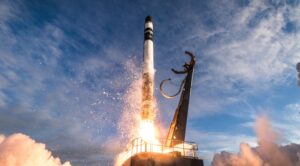Rocket Lab increases Electron payload capacity
By Jeff Foust

WASHINGTON — Rocket Lab announced Aug. 4 it has increased the payload capacity of its Electron launch vehicle thanks to improvements in the batteries used in the rocket.
Rocket Lab previously promoted a payload capacity of 150 kilograms to a 500-kilometer sun-synchronous orbit (SSO) and 225 kilograms to lower orbits. The company now says the vehicle can place 200 kilograms into SSO and 300 kilograms in lower orbits.
“Electron remains right-sized for the smallsat market, and releasing additional performance is about providing our customers with even more flexibility on the same proven vehicle they have come to rely on,” Peter Beck, chief executive of Rocket Lab, said in a statement.
Rocket Lab credited the increased payload capacity to advances in battery technology. The rocket uses batteries to power electric pumps, rather than conventional turbopumps, for its Rutherford engines. Improved performance of the batteries would reduce the mass of the batteries required, which translates into increased payload capacity.
The loss of power to the pumps when an electrical connection failed caused the Rutherford engine to shut down on Electron’s most recent launch July 4. The company, discussing the outcome of the investigation July 31, said that it would revise testing procedures to detect that problem on future vehicles.
“What we saw is an electrical connection fail, which ultimately resulted in the termination of thrust of the vehicle,” Beck said during an Aug. 3 SpaceNews webinar.
Rocket Lab plans to resume Electron launches this month. “We’ll be rolling out here and flying in the next 10 or 12 days,” he said. The company hasn’t disclosed the customer for that mission but Beck said it will do so “very, very shortly.”
During an Aug. 4 webinar by Northern Sky Research, Lars Hoffman, senior vice president for global launch services at Rocket Lab, said the company has continued to see strong interest in its launch services, even amid the pandemic.
“We’ve really not seen a slowdown in demand. In fact, what we’ve seen is that customers who were scheduled to launch on other launch providers, who are affected by that launch provider being delayed, have turned to us to see if we could manifest them in the short term,” he said. “We’re anxious to get back to normal launch operations.”
August 5, 2020 at 01:26AM
via SpaceNews read more...

Post a Comment